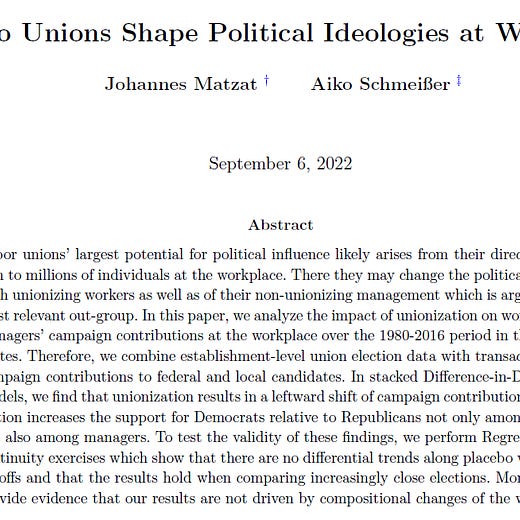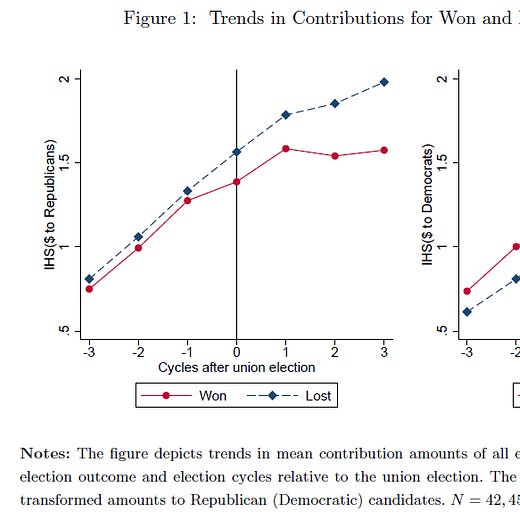Best of #econtwitter - Week of September 11, 2022 [2/2]
Sep 14, 2022
Welcome readers old and new to this week’s edition of Best of Econtwitter. Please submit suggestions — very much including your own work! — over email or on Twitter @just_economics.
This is part two of two.
Paper summaries

Brian Nosek@BrianNosek
Massive status bias in peer review.
534 reviewers randomized to review the same paper revealing the low status, high status, or neither author. 65% reject low status, 23% reject high status.
Amazing work by Juergen Huber and colleagues. #prc9

4:08 PM · Sep 9, 2022
3.54K Reposts · 11.6K Likes
^there was a one-tweet summary of this in the Aug 28 edition, but worth having again in here

Brian Nosek@BrianNosek
Secondary finding. >3000 potential reviewers were invited with the low, high, or neither status author revealed as the corresponding author in the review invitation. Reviewers substantially more likely to agree to review in the high status revealed condition.

4:19 PM · Sep 9, 2022
63 Reposts · 534 Likes
^also, obviously(?), this is all positive not normative… refereeing is not zero-cost, also it’s hard

Johannes Matzat@matzatecon
New WP with @AikoSchmeisser!
Do unions shape political ideologies at work?
Yes!


1:28 PM · Sep 7, 2022
269 Reposts · 1.58K Likes

Antonin Bergeaud@a_bergeaud
How can we measure the contribution of China to pushing the technological frontier? With @CyrilVerluise we are happy to realease this new draft.
In short, we use ML to select patents related to six illustrative tech and look at the contribution of China, Japan, Europe and the US

2:15 PM · Sep 7, 2022
12 Reposts · 67 Likes

Felix Poege@f_poege
Finally out as working paper: "Competition and Innovation: The Breakup of IG Farben"
IG Farben used to be the world's largest chemical company, and its post-WW2 breakup ranks among the major antitrust events in history.
What happened to innovation?
papers.ssrn.com/sol3/papers.cf…

4:09 PM · Sep 6, 2022
65 Reposts · 267 Likes

Nitya Pandalai-Nayar@nityanayar
Now a thread about the paper! We estimate the slope and curvature of industry supply curves using several instruments and find strong evidence of convexity (1/3)

AEA Journals @AEAjournals
Forthcoming in the AER: "Convex Supply Curves" by Christoph E. Boehm and Nitya Pandalai-Nayar. https://t.co/nsYiPwl1nl
3:14 PM · Sep 8, 2022
7 Reposts · 53 Likes

Ethan Mollick@emollick
The most consequential book banning is for a book you probably never heard of: Charles Knowlton’s “Fruits of Philosophy; or, the Private Companion of Young Married People.”
A new paper suggests that the trial around this banned book had huge consequences for the world… 1/

2:52 AM · Sep 5, 2022
144 Reposts · 537 Likes

Ethan Mollick@emollick
Catalyzed by the trial, birth rates plummeted as the discussion about contraception spread throughout the English-speaking world.
This decrease in fertility, known as the Demographic Transition, greatly boosted the per-capita income of the US, UK, Australia & others. 4/


2:52 AM · Sep 5, 2022
13 Reposts · 105 Likes

Clemence Tricaud@ClemenceTricaud
📢New WP! "#Gender and #Electoral Incentives: Evidence from Crisis Response" (joint with @JP_Chauvin)
Why do female leaders behave differently? Can electoral incentives help explain gender differences?
👉Full paper: clemence.tricaud.com/research
Summary👇 1/9

3:20 PM · Sep 8, 2022
11 Reposts · 81 Likes

Derek Rury@DerekRury
!New working paper! In this paper, I show how classroom rank in kindergarten causes significant effects on short and long-run academic outcomes. 1/n

9:25 PM · Sep 6, 2022
33 Reposts · 137 Likes

Victor H. Aguiar@vectornomist
A new short paper with Roberto: Slutsky Matrix Symmetry: A New Behavioral Condition. We make connections with the literature on price inattention and departures from symmetric behavior in the substitution patterns of consumption
researchgate.net/publication/36…

2:47 PM · Sep 8, 2022
13 Reposts · 63 Likes
More: Medicare Advantage vs traditional Medicare; weather shocks and food price seasonality; tracking consumers; US health care wait time
Interesting discussions

Matt Clancy@mattsclancy
New post!
mattsclancy.substack.com
What if we could automate invention?

2:03 PM · Sep 6, 2022
21 Reposts · 112 Likes
^Aghion, Jones, and Jones (2019)

anthonyleezhang.eth@AnthonyLeeZhang
This is good advice for econ/finance paper presentations as well

Patrick McKenzie @patio11
After reading ~thousands of YC applications one common factor differentiating the best ones from the median ones is that the median one looks more like "Generically smart person read one article about this topic in the mainstream press."
Which, better than nothing, but.
2:25 AM · Sep 12, 2022
6 Likes

Vijay Chidambaram@vj_chidambaram
Just released the first draft of the Funding chapter in the "CS Assistant Prof Book"
vijay03.github.io/asstprofbook/c…
With an example budget, and answers to common questions such as "what are indirect costs"!
Book at: vijay03.github.io/asstprofbook/

4:17 PM · Sep 11, 2022
32 Reposts · 216 Likes

daniel f stone 🍻@d_f_stone
Alfred Marshall on how to use math in econ
core-econ.org/the-economy/bo…

11:33 AM · Sep 10, 2022
7 Reposts · 18 Likes
^tempting to include this one in every edition of the newsletter

